Strengthening Public Health Systems & Services in Indian Country
To preserve our homelands, defend rights of the Indian Treaties with the United States, speak in a unified voice, offer support to our people, offer a forum in which to consult each other and enlighten each other about our people, and to otherwise promote the common welfare of all the Indian People of Montana, Wyoming, and Idaho.
BACKGROUND
The Rocky Mountain Tribal Leaders Council (RMTLC) of Billings, Montana is a consortium of federally recognized Tribes in Montana, Wyoming, Idaho, and the Piikani First Nation of Alberta, Canada. Member Tribes in Montana, Wyoming, and Idaho include the: Blackfeet Tribal Business Council, Confederated Salish and Kootenai Tribal Council, Chippewa Cree of Rocky Boy, Little Shell Tribe of Chippewa Indians, Ft. Belknap Indian Community Council, Ft. Peck Assiniboine and Sioux Tribes, Crow Tribal Council, Eastern Shoshone Business Council, Northern Arapaho Business Council and the Shoshone Bannock Tribes of Ft. Hall, Idaho.
PURPOSE
RMTLC titled the SPHSSIC project; “Tying Public Health Resources and Services Together in Indian Country,” the program will take a comprehensive approach to working with the RMTLC-affiliated Tribes in Montana and Wyoming. RMTLC will work with each Tribe and all the Tribes collectively to develop community-based approaches to public health and wellness, based on the unique needs of each Tribe and the guidance provided by Tribal health leaders and community steering committees.
ABOUT
SPHSSIC is a 5-year grant funded by the Centers for Disease Control and Prevention (CDC). The program aims to strengthen the quality, performance, and infrastructure of Tribal public health systems. This includes workforce, data and information systems, and programs and services. Tribes work to improve capacity to develop, implement, and evaluate public health programs and services utilizing Indigenous knowledge and approach.
CDC SPHSSIC grant funding at RMTLC focuses on two areas:
- Funding Strategy-1(FS-1) is to provide full support to the TLC Health Subcommittee. RMTLC is working with the TLC Health Subcommittee (composed of Tribal Health Directors/CEOs and Tribal Leaders from the Tribes) to strengthen their community-based, community-designed, and community-controlled public health services and programs.
- Funding Strategy-2 (FS-2) is designed for RMTLC-affiliated Indian Tribes in Montana and Wyoming to heal from the overdose epidemic by developing comprehensive, community-based, culturally informed approaches to preventing overdose, including polysubstance use. The project will emphasize the use of community-driven approaches that include local culture and Indigenous knowledge in all stages of public health programming (planning, implementation, and evaluation).
What is SPHSSIC
The SPHSSIC project aims to strengthen Tribal public health systems and services, especially programs and services focused on Overdose Prevention in Indian Country. SPHSSIC advocates for health services and programs to meet Tribal public health needs in three areas.
- Enhance protective factors related to the prevention of overdoses through community-based cultural interventions.
- Develop and maintain a diverse workforce with cross-cutting skills and competencies.
- Engage public safety partners to respond to overdoses and prevent them.
Tribes collaborate with RMTLC SPHSSIC to implement activities through a cooperative agreement and annual funding of $50,000.00. Funding supports local coordinators, operations, steering committee meetings and expenses, and travel support when request for one tribal elected official and Tribal Health Director (or an appointed representative as replacement) to the TLC Health Subcommittee meetings as program funds are available.
Why is SPHSSIC Needed?

Opioid overdoses and deaths disproportionately impact American Indians in Montana and Wyoming. Tribal Public health programs and systems are leading efforts in communities to prevent overdoses through outreach, education, training, community-based activities, and strengthening public health in communities.
Who Does SPHSSIC Serve?

RMTLC SPHSSIC serves all Tribes in Montana and Wyoming:
- Fort Peck
- Fort Belknap
- Little Shell
- Blackfeet
- Confederated Salish and Kootenai
- Rocky Boy
- Crow
- Eastern Shoshone
- Northern Arapaho
When is SPHSSIC happening?
August 31, 2023, to August 30, 2028.
The SPHSSIC Year-1 activities include:
- Cooperative Agreements with the Tribes to strengthen Tribal health services.
- Steering Committees to help oversee the development of community-based and community-designed services.
- Comprehensive Tribal Action Plans that emphasize a coordinated community response (approach) to address the problem of drug overdoses within their local Tribal community.
2023-2024
100% of Tribes signed cooperative agreements

$450,000 in funding awarded through cooperative agreements ($50,000.00 per Tribe after completion of deliverables)

100% Tribes have an active local Steering Committee in place

All 9 Tribes have adopted and utilized the ODMAP (Overdose Detection Mapping Applications Program)

100% Tribes participated and completed the SWOT/SCOT analysis activity

- Ongoing support of Tribal Health Subcommittee
- Participation in health fairs, health conferences, on-site meetings
- Support to Tribal programs
- Tribal action planning processes underway, informed by Tribal community perspectives of Strengths, Challenges, Opportunities, and Threats survey (May 2024)









